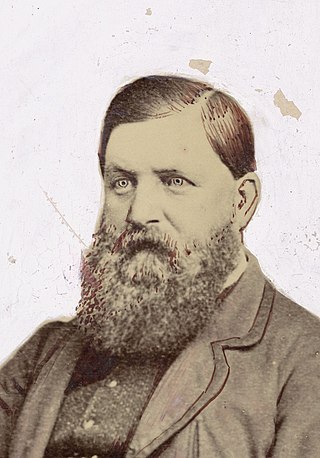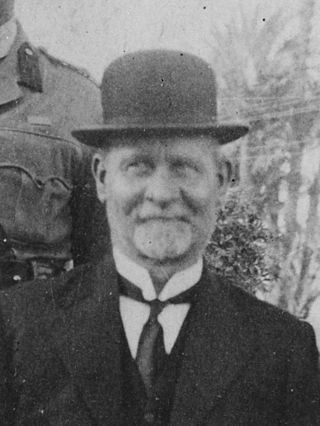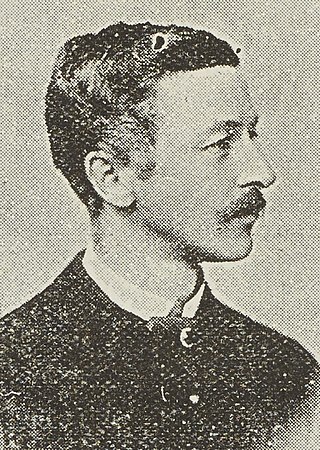Related Research Articles

Nelson is a New Zealand parliamentary electorate, returning one Member of Parliament to the House of Representatives of New Zealand. From 1853 to 1860, the electorate was called Town of Nelson. From 1860 to 1881, it was City of Nelson. The electorate is the only one that has continuously existed since the 1st Parliament in 1853.

William Henry Eyes was a British-born, New Zealand politician who was the fifth Superintendent of the Marlborough Province, and who represented the Wairau electorate in the New Zealand House of Representatives for many years. Born in England, Eyes had emigrated to Australia in 1839. He was jailed at Parramatta Gaol for a year before he was pardoned, after which he immediately emigrated to New Zealand.

Arthur Penrose Seymour was a 19th-century New Zealand politician from Picton. He was the 4th Superintendent of the Marlborough Province and was a member of the provincial government for all 16 years of its existence. With his strong advocacy for Picton, he successfully had the Seat of Government moved to Picton. When the Blenheim party secured a majority in the Provincial Council by 1865, Seymour negotiated the removal of the Seat of Government back to Blenheim.
Tasman is a former New Zealand parliamentary electorate, from 1972 to 1996.
Wairau was a parliamentary electorate in the Marlborough Region of New Zealand. It was one of the initial 24 New Zealand electorates and existed from 1853 until its abolition in 1938, when it was succeeded by the Marlborough electorate. The electorate had 13 representatives during its existence. The 1861 election in the Wairau electorate was notable in that a later Premier, Frederick Weld, was unexpectedly and narrowly defeated by William Henry Eyes.
Waimea-Picton was a parliamentary electorate in the Marlborough and Nelson Regions of New Zealand, from 1887 to 1893.
Picton was a parliamentary electorate in the Marlborough Region of New Zealand, from 1861 to 1887.
Waimea was a parliamentary electorate in the Nelson Province of New Zealand, from 1853 to 1887. Initially represented by two members, it was a single-member electorate from 1861.

Richard McCallum was a Liberal Party Member of Parliament in New Zealand, and later a member of the Legislative Council. A barrister from Blenheim, he held many local positions, including two years as Mayor of Blenheim. One of his main interests was the advancement of education.

Richmond Hursthouse was a 19th-century Member of Parliament in Nelson, New Zealand, and a cabinet minister.
The 4th New Zealand Parliament was a term of the Parliament of New Zealand.

Andrew James Richmond was a 19th-century Member of Parliament in Golden Bay / Mohua and Nelson, New Zealand.

William Adams was a 19th-century Member of Parliament from Marlborough, New Zealand and the first Superintendent of Marlborough Province.

William Acton Blakeway Adams, known as Acton Adams, was a 19th-century Member of Parliament from Nelson, New Zealand.

The mayor of Blenheim officiated over the borough of Blenheim, New Zealand. The office was created in 1869 when Blenheim became a borough, and ceased with the 1989 local government reforms, when Blenheim Borough was amalgamated with Picton Borough and Marlborough County Council to form Marlborough District. There were 31 mayors of Blenheim. The last mayor of Blenheim, Leo McKendry, was elected as the first mayor of Marlborough.

The Wairau by-election 1872 was a by-election held in the Wairau electorate during the 5th New Zealand Parliament, on 19 February 1872. The by-election was caused by the resignation of incumbent MP William Henry Eyes and was won by Arthur Seymour, who defeated Joseph Ward. Both candidates were prominent Marlborough politicians, and for both of them, this was their first attempt at election to the General Assembly.

The 21 June 1875 Wairau by-election was a by-election held in the Wairau electorate in the Marlborough Province during the 5th New Zealand Parliament. The by-election was caused by the resignation of incumbent MP Arthur Seymour and was won by Joseph Ward, who defeated William Sefton Moorhouse. Ward was a well-known politician in Marlborough. Moorhouse had political seniority over Ward and was at the time Mayor of Wellington, but had no personal connection to Marlborough.
The 1867 Picton by-election was a by-election held on 25 July 1867 in the Picton electorate during the 4th New Zealand Parliament.
The 1868 Collingwood by-election was a by-election held on 18 March 1868 in the Collingwood electorate during the 4th New Zealand Parliament.

Alfred George Fell was a New Zealand businessman who served as the sixth mayor of Blenheim.
References
- ↑ Wilson, James Oakley (1985) [First ed. published 1913]. New Zealand Parliamentary Record, 1840–1984 (4th ed.). Wellington: V.R. Ward, Govt. Printer. p. 179. OCLC 154283103.
- ↑ "Marlborough". Wellington Independent. 9 June 1868.
- ↑ "Untitled". Nelson Evening Mail. 15 June 1868.
- ↑ "Latest News From Nelson". Evening Post. 18 June 1868.
- ↑ "Local and General News". Marlborough Express. 20 June 1868.